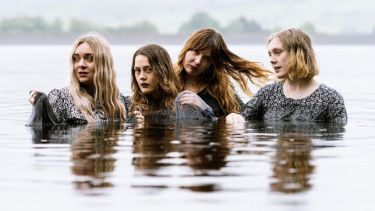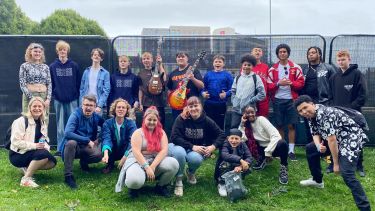Lucy Revis: Session musician, music educator and 91̀½»¨ Made Musician

Why did you study Music?
I studied music as I have always had a passion for the connections built when performing and creating. I would choose to study it again if I could!
Why did you study Music at the University of 91̀½»¨?
When I came to 91̀½»¨ I just had a really strong sense of this was a good place in the country to be. My parents are from Leeds and I grew up in Northamptonshire so I've always had an affinity to Yorkshire. And the warmth from the Music department and all the people that were there just made me think I could get on well here as a slightly nervous undergrad. The staff were welcoming and there were plenty of ensembles to join, I liked the mix of modules.
Which parts of your studies did you enjoy most?
I've never found academia easy and I've always been quite practical and sociable, so playing my instrument was definitely key - I play the cello. I spent a lot of time doing anything performance based such as orchestra, ensembles and setting up quartets. However, I was also really interested in education modules, the general listening modules and music history.
My favourite ever module was probably the recording industry module. That made me get out in the city and meet people - I met Alan Smyth who's worked with Arctic Monkeys and Pulp, and I got most of my session work in my early years via that connection.
Lucy Revis
BMus Music alumni
What kind of extracurricular activities did you get involved in?
I really threw myself into extracurricular activities. For example, we set up a string quartet which became a source of income as we played at weddings. And through encouragement from staff, I broke out of my course bubble and delved into the city, which introduced me to different people that I could perform with and get work.
What is the community like in the Music department?
The staff are actively involved and immersed in industry and music in the city which is amazing and they’re really encouraging. The students also really look out for one another - even now, if something crops up we all still send it to each other or suggest people that we used to go to university with. It's a lifelong connection.
Can you give us a whistle stop tour of your career journey?
Whilst at University, I interviewed for a teaching post which I did concurrently alongside my master's degree to help fund my living costs. I taught Peripatetic cello and was the coach for the cello section of the Derbyshire Youth Orchestra. I also directed some string ensembles at Northeastern Derbyshire Music Centre and worked in schools.
And then in terms of the performance side, I’ve done session stuff for bands which meant I was touring as much as I could alongside teaching. I've done lots of different tours and performances with different artists, as well as playing on the radio, playing on various shows, loads of albums, and random little projects. Then I started my own band Before Breakfast, with my best mate from Uni. The lineup is all music alumni plus a recently graduated student, so the whole band is made up of Sheff Uni music students which is really nice. We've featured on Radio 1, 6Music, and local introducing shows ticking off local venues like - The Leadmill, 91̀½»¨ Arena and the Upper Chapel as well national spots such as Wembley arena, Manchester Albert Hall and The Sage.
This all began whilst studying where I made many contacts with bands such as local stars, Reverend and the Makers and I used my time to network and fine tune my performance skills.
Lucy Revis
BMus Music alumni
And now, probably for eight years, I've worked at 91̀½»¨ Music School. Initially, I was head of the junior department, then I took over as director in 2021 and took the music school in a completely different direction, so that it was more charitable - now it's called the Tracks Project. It’s probably one of the most important parts of my career. We work with loads of different children - vulnerable children, looked after children, children from low-income families etc, and provide free music lessons and free provision for them. I also work for 91̀½»¨ Flourish and help coordinate the The 91̀½»¨ Mental Health Guide.
Do you have any career highlights?
A highlight of the music school is probably the performance we did last year - we had our choir, our rap group, our rock bands, and our R&B groups all do a cover of Stormzy, Hide and Seek. It was just a really amazing moment where all the different children got together, from aged five to eighteen, and performed this really cool song. It's one of those jobs where you always have something nice happen, even if you’re having a tough week there's always something really great that happens.
There are a few highlights with my band as well - we played Tramlines main stage and Latitude introducing stage in the same weekend, which was really amazing. And we supported Paul Heaton at the arena which was also pretty cool.
And then a highlight of my session work is probably when I did a show completely out of my comfort zone - I did a show for a rapper called Gigs at Wembley arena. Kano and Lethal Bizzle were there which was a bit of a surreal moment, because that's the kind of music I listened to when I was younger. I usually do indie, folk or pop stuff, so it was a big moment to do something completely different.
How did the course help you with your career and ambitions?
The course allowed me to see the potential for a variety of jobs in music. I have always loved to move between different projects whilst keeping music and community at the heart, and I was able to dip my toes in many different areas.
I am proud to have remained in 91̀½»¨ working hard to build more opportunities for the young people I work with and perform with other 91̀½»¨ Alumni Gina Walters and Molly Clark in our band.
I was also able to see that the careers of our tutors were varied and wide reaching which was inspiring.
Do you have any tips for Music students now?
Be as open as you can. I know it's not easy for everyone to go and talk to people all the time, but I think if you feel confident enough, go up to people and ask them what they do and get their contact details. The main thing that you can do to enhance what your lecturers are doing is to speak to people and make connections. At the end of the day, if you make a network outside of your university course, they’re the ones who will be there after you’ve graduated.
Do modules that you didn't necessarily think would be for you. I have lots of friends who didn’t end up actually going into music and are doing incredibly well in other industries. I never thought I’d end up being the director of a charity, doing the budgets and the numbers, but I love it! So, take risks as who knows what you might end up enjoying.


